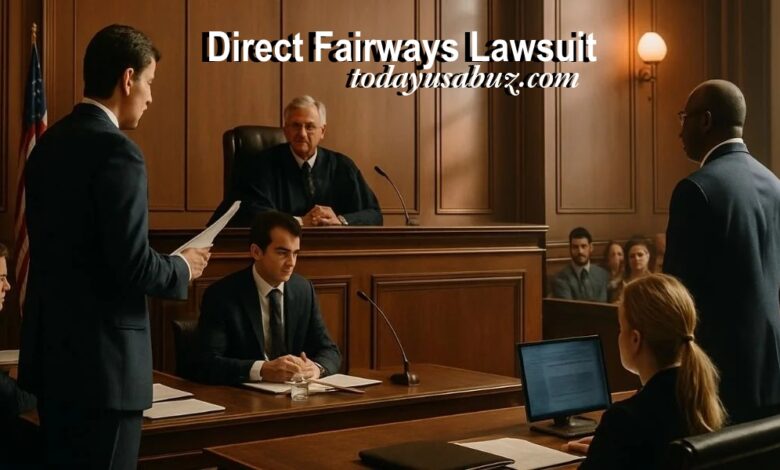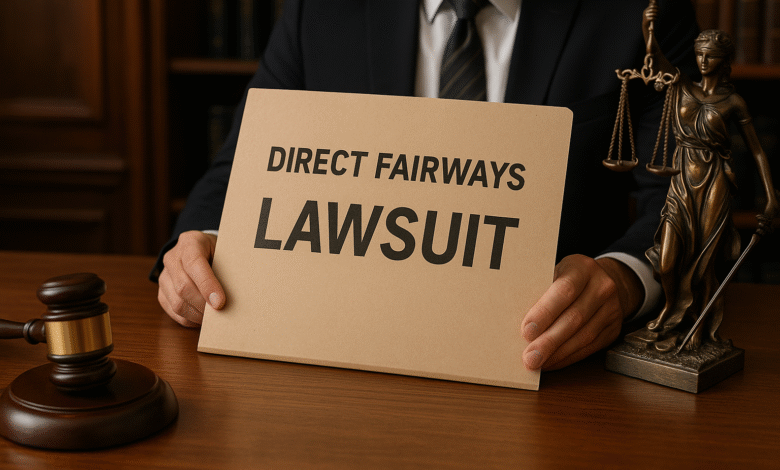Direct Fairways Lawsuit – Everything You Need to Know

Introduction to the Direct Fairways Lawsuit
When people hear about Direct Fairways Lawsuit involving marketing companies, curiosity is often sparked. One name that has surfaced in recent years is Direct Fairways. This company, known for providing marketing services—particularly to golf courses and related businesses—has found itself in the middle of legal conversations. The Direct Fairways lawsuit has become a topic of debate in professional circles, with many trying to understand what exactly happened, why it matters, and what lessons can be learned.
At its core, this lawsuit highlights how complicated relationships between marketing firms and their clients can become. When promises don’t align with outcomes, tensions often escalate. For a company like Direct Fairways Lawsuit which has marketed itself as a specialist in helping golf courses grow visibility and attract new customers, such scrutiny raises bigger questions about transparency, trust, and accountability in the advertising industry.
Before diving deeper, it’s important to remember that lawsuits are not always black-and-white. They can involve misunderstandings, unmet expectations, or genuine misconduct. With the Direct Fairways Lawsuit all of these factors are being carefully considered, making it more than just a headline—it’s a case study for how businesses and clients interact in today’s competitive marketplace.
Who Is Direct Fairways Lawsuit?

Direct Fairways Lawsuit is a marketing company that has carved a niche for itself in the golf industry. Unlike broad advertising agencies, Direct Fairways focuses on providing tailored marketing strategies to golf courses, country clubs, and businesses connected to the golfing world. Their services typically include print advertising, digital campaigns, SEO, and community outreach, all designed to boost a golf course’s visibility and membership base.
The idea behind Direct Fairways Lawsuit model is simple: golf courses are often smaller businesses that don’t have big marketing budgets. They need specialized support to attract golfers, especially in an era where digital marketing dominates. By promising to fill that gap, Direct Fairways positioned itself as the go-to partner for local golf course advertising.
For many clients, this approach worked well. Reports suggest that some golf courses saw real benefits, like increased traffic, more players on the green, and better community awareness. However, not every client’s experience was the same. This discrepancy is where trouble started brewing, and eventually, why Direct Fairways Lawsuit and complaints began to surface.
What Sparked the Lawsuit?
The Direct Fairways lawsuit primarily revolves around customer dissatisfaction and allegations of misleading business practices. Some clients claimed that the services they paid for didn’t match the promises made during the sales pitch. Others felt that the company exaggerated the results they could deliver or locked clients into agreements that were difficult to exit.
In industries like marketing, where results are not always immediate or guaranteed, disputes like this are common. However, when enough clients feel wronged, the situation often escalates. In this case, Direct Fairways Lawsuit and legal complaints became the way for unhappy clients to voice their frustrations and hold the company accountable.
It’s also worth noting that the Direct Fairways Lawsuit highlighted broader issues in marketing contracts—such as unclear terms, lack of transparency in performance metrics, and aggressive sales tactics. Whether or not Direct Fairways intended to mislead clients, these allegations underline the importance of clear communication and ethical business practices in the advertising world.
Key Allegations Against Direct Fairways
Every Direct Fairways Lawsuit comes with specific claims, and the Direct Fairways case is no different. The allegations generally fall into three major categories:
- Misrepresentation of Services
Clients argued that the marketing services they purchased didn’t deliver on the promises made. This could range from overpromising results to underdelivering on actual advertising campaigns. - Contractual Disputes
Several clients claimed they were locked into long-term contracts without fully understanding the terms. When they wanted to exit or cancel, they faced unexpected fees or resistance. - Aggressive Sales Tactics
Some clients accused the company of using high-pressure sales techniques to close deals. While not illegal on its own, such tactics can create resentment if the delivered product doesn’t meet expectations.
Together, these allegations painted a picture of a company that some believed prioritized sales over long-term client satisfaction. Even if not all claims were proven in court, the accusations alone were enough to damage Direct Fairways’ reputation.
How Direct Fairways Responded
Like any company facing legal scrutiny, Direct Fairways Lawsuit has not remained silent. The business defended its practices by emphasizing that marketing is never an exact science. Results can vary based on many factors, including the local market, competition, and how actively the client engages with the campaign.
Direct Fairways Lawsuit also pointed out that many of their clients were satisfied with the services provided, and that complaints represented only a fraction of their customer base. From their perspective, the lawsuit may have exaggerated the scope of dissatisfaction, ignoring the positive outcomes experienced by numerous golf courses across the country.
This defense highlights a common tension in the advertising world: balancing client expectations with realistic outcomes. While some clients want instant results, others understand that marketing often requires time and patience. Direct Fairways Lawsuit leaned on this argument to counter claims of wrongdoing.
The Broader Implications of the Lawsuit
The Direct Fairways lawsuit is more than just a story about one company. It serves as a cautionary tale for both businesses offering marketing services and clients purchasing them. For service providers, it emphasizes the importance of honesty, transparency, and setting realistic expectations. Overselling results might win short-term contracts, but it risks long-term damage if clients feel deceived.
For clients, the case reinforces the need to thoroughly vet marketing companies before signing contracts. Asking the right questions, reading the fine print, and seeking references can help avoid misunderstandings later. The Direct Fairways Lawsuit shows what can happen when either side fails to take these steps seriously.
Additionally, the case underscores the growing role of online reviews and reputation management. In today’s digital era, even a handful of public complaints can escalate into significant damage for a brand. Direct Fairways has had to contend not only with legal challenges but also with reputational ones, as the Direct Fairways Lawsuit drew attention to unhappy clients’ experiences.
Lessons for Businesses in the Marketing Industry
The advertising world is full of competition, and companies like Direct Fairways must constantly prove their value. The Direct Fairways Lawsuit provides valuable lessons for businesses in this sector:
- Clarity in Contracts: Marketing companies should use clear, easy-to-understand agreements that outline what clients can realistically expect.
- Transparency in Results: Instead of overselling, businesses should provide real examples, case studies, and transparent reporting to set proper expectations.
- Focus on Long-Term Relationships: Aggressive sales tactics may secure short-term revenue, but satisfied clients create sustainable growth.
These lessons are not just for Direct Fairways Lawsuit—they’re for every marketing company navigating today’s fast-paced environment.
What Clients Should Take Away
For clients—whether golf courses or other small businesses—the Direct Fairways Lawsuit is a reminder to stay vigilant. Always research the marketing firm you’re considering, and don’t hesitate to ask for detailed performance metrics, client testimonials, and trial periods if possible.
It’s also essential to avoid rushing into contracts under pressure. High-pressure sales tactics may make a deal seem urgent, but taking the time to fully understand terms and conditions can save a lot of headaches later. In essence, the Direct Fairways Lawsuit reminds clients to prioritize due diligence over quick decisions.
Clients should also remember that not every dispute indicates malicious intent. Sometimes, miscommunication or unrealistic expectations are at fault. That’s why establishing a clear line of communication from the very beginning is critical.
Conclusion: Why the Direct Fairways Lawsuit Matters
The Direct Fairways lawsuit is not just another legal case—it’s a story that encapsulates the challenges of doing business in the marketing world. It sheds light on the importance of transparency, trust, and accountability for both service providers and clients.
For Direct Fairways Lawsuit has been a test of resilience, forcing the company to re-examine its practices and defend its reputation. For clients and other businesses, it has become a wake-up call to approach marketing partnerships with careful consideration.
At the end of the day, lawsuits like this one remind us that in business, relationships matter as much as results. When both sides prioritize honesty and communication, the chances of conflict decrease dramatically. The Direct Fairways lawsuit may be specific to the golf industry, but its lessons apply universally across all sectors where services, expectations, and promises intersect.



